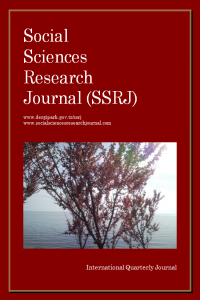Redemption through ‘New Beginnings’: Reading The Kite Runner by K. Hosseini
Kurtuluş, insancıllık, ahlaki yaptırımlar, The Kite Runner
___
- Asif, M. Rashid, A.R., İsmail, H. H., Al-Smadi, O. (2020), Sisterhood as a Savior of Afghan Women: An Analysis of Khaled Hosseini’s Ideology, English Language and Literature Studies. November. 4(4), p.78-87.
- Asif, M., Rashid, R. A., Saleem, M. (2020), Marriage as an Oppression of Women: An Analysis of Khaled Hosseini’s Novels, Journal of Qualitative Social Sciences, 2(3), p.1-13.
- Bhat, N. J. (2015), Sin and Redemption in Khaled Hosseini’s The Kite Runner, The Criterion: An International Journal in English, 6(2), p.283-286.
- Dewani, R. (2021), Historical, Political and Cultural Context of Khaled Hosseini’s The Kite Runner, International Journal for Innovative Research in Multidisciplinary Field, 7(9), p. 196-198.
- Du, J. (2017), A Journey of Self-Actualization of Amir in The Kite Runner, English Language and Literature Studies, 7(3), p. 90-93.
- Fadzlin, A. T. (2013), Once Upon a Kite: Glimpses into Afghanistan’s Race Relations, Kaleidoscope: The Interdisciplinary Postgraduate Journal of Durham University’s Institute of Advanced Study, 5(2), p.119- 130.
- Hosseini, K. (2018), The Kite Runner, Bloomsbury Puplishing, UK.
- Jefferess, D. (2009), To be good (again): The Kite Runner as Allegory of Global Ethics, Journal of Postcolonial Writing, 45(4), p. 389-400.
- Kalpaklı, F. (2017), The Relationship between Nature and Human Psyche in The Kite Runner, The Journal of International Social Research, 10(48), p. 82-85.
- Khadawardi, H. (2017), Superego, Guilt, Redemption and Atonement in Khaled Hosseini’s The Kite Runner, International Journal of Humanities Social Sciences and Education (IJHSSE), 4(2), p. 88-99.
- Mirzapour, N., Samadian, A. (2021), Embodiment of Gender Discrimination in Khaled Hosseini’s The Kite Runner and Thousand Splendid Suns, 5th International Conference on Language, Literature, Culture and History Studies. Proceedings.
- Noor, R. (2004), The Kite Runner, The World Literature Today, 78(3/4).
- Saraswat, N. (2014), Theme of Identity and Redemption in Khaled Hosseini’s The Kite Runner, International Journal of Interdisciplinary and Multidisciplinary Studies (IJIMS), 1(5), p. 166-175. Stuhr, R. (2009), Reading Khaled Hosseini. Greenwood Publishing.
- Winkler, L. (2007), A Study Guide to the Riverhead Edition Khaled Hosseini’s The Kite Runner, New York: Penguin Books.
- Yayın Aralığı: Yılda 4 Sayı
- Yayıncı: Denta Florya ADSM Limited Company
Faslı Yazar Tâhir Bin Cellûn'dan Rüşvet Üzerine Sarsıcı Bir Kurgu (Bay Ahlakın Çöküşü)
Türkiye’de Yurtiçi Tasarruflar ve Ekonomik Büyüme Arasındaki İlişkinin NARDL Yöntemiyle Analizi
Ecehan TURGUT, Emel GÖNENÇ GÜLER
Sektörel Kalkınmada Turizm ve Belediyeler: Eğirdir Örneği
Zişan KORKMAZ ÖZCAN, Nazlı İBİŞ
SÜRDÜRÜLEBİLİR KALKINMA PERSPEKTİFİNDEN YEŞİL FİNANS
Redemption through ‘New Beginnings’: Reading The Kite Runner by K. Hosseini
Türkiye’de Zorunlu Eğitim Serencâmı: Ulusal, Bölgesel ve Uluslararası Bir Değerlendirme
Derya GÜLTEKİN, Pınar ÖZCANLI BARAN
HALKLA İLİŞKİLERDE YENİ YÖNELİMLER: NÖRO-HALKLA İLİŞKİLER (NÖRO’PR)
Yönetişim Doğrudan Yabancı Yatırımlar İçin Önemli mi? Karşılaştırmalı Bir Analiz
